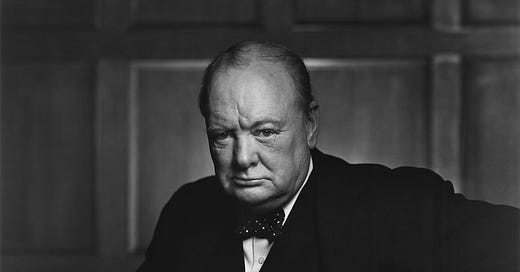Weekly hit of history: Winston Churchill becomes Prime Minister
Summary
Eighty-three years ago this May 10, Winston Churchill became Prime Minister of the United Kingdom in the midst of WWII. Though Britain had already been in a state of war with Nazi Germany for nearly a year, this period came to be known as the “Sitzkrieg”—the “Phony War”—during which no major combat broke out on the Western Front. This Phony War ended the very day that Churchill took power, as German tanks blasted their way through Belgium, the Netherlands, and France, eventually rolling through the streets of Paris and forcing Western Europe’s surrender in a few short weeks.
Churchill played a crucial role in rallying not just his cabinet, but the entirety of Britain in refusing to negotiate peace terms with Adolf Hitler at a time when some prominent figures wished to do just that. In his first speech as prime minister to the House of Commons in Parliament, Churchill famously vowed that he would aim for nothing short of “victory, victory at all costs, victory in spite of all terror, victory, however long and hard the road may be.” Churchill would remain in power for the next five years, joining the United States and Soviet Union in finally defeating Nazi Germany and bringing peace to Europe.

Why should you care?
Churchill would later write of his becoming prime minister: “I felt as if I were walking with Destiny, and that all my past life had been but a preparation for this hour and for this trial.” It is certainly easy to see Churchill’s destiny now: without Churchill at the helm, Britain may have signed a humiliating peace treaty with Germany. The consequences of such a surrender would have been enormous: Britain not only provided millions of troops for the war effort, it also acted as an “unsinkable aircraft carrier” right off the coast of Europe, providing a base for Allied aircraft as well as the critical staging ground for D-Day.
Churchill would guide Britain through some of the war’s darkest days, including an entire year when the British Empire had to face the full might of Nazi Germany on its own, suffering through a merciless German bombardment that killed 40,000 innocent civilians. His world-famous speeches—masterpieces of the English language—played a vital role in motivating the British public to fight on despite the horrors of the war.
Churchill refused to negotiate with Hitler and he steered Britain to act as the linchpin of what he later termed the “Grand Alliance”—the British Empire, United States, and Soviet Union. The Great Alliance eventually defeated Nazi Germany and ended its brutal domination of Europe. The free world forever owes its gratitude to his fearless leadership and tenacity in the face of evil.





